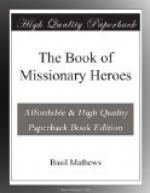“We promise,” they said. They gathered around her and she told them the story of Jesus Christ in whose name she had come to them.
“Now,” she said, “go to your rest and fight no more.” And the tribes kept their promise to her,—so that when she returned they could say, “It is peace.”
* * * * *
For nearly forty years she worked on in Calabar, stricken scores of times with fever. She rescued her hundreds of twin babies thrown out to die in the forest, stopped wars and ordeal by poison, made peace, healed the sick.
At last, too weak to walk, she was wheeled through the forests and along the valleys by some of her “twins” now grown to strong children, and died there—the conquering Queen of Calabar, who ruled in the hearts of even the fiercest cannibals through the power of the Faith, by which out of weakness she was made strong.
FOOTNOTES:
[Footnote 57: The African uses the word “Ma” as mother, (a) to name a woman after her eldest son, e.g. Mrs. Livingstone was called Ma-Robert; and (b) as in this case, for a woman whom they respect.]
Book Four: HEROINES AND HEROES OF PLATEAU AND DESERT
CHAPTER XXIII
SONS OF THE DESERT
Abdallah and Sabat
(Time of Incidents, about 1800-1810)
Two Arab Wanderers
One day, more than a hundred years ago, two young Arabs, Abdallah and Sabat, rode on their camels toward a city that was hidden among the tawny hills standing upon the skyline.
The sun was beginning to drop toward the edge of the desert away in the direction of the Red Sea. The shadows of the long swinging legs of the camels wavered in grotesque lines on the sand. There was a look of excited expectation in the eyes of the young Arabs; for, by sunset, their feet would walk the city of their dreams.
They were bound for Mecca, the birthplace of Mohammed, the Holy City toward which every man of the Mohammedan world turns five times a day as he cries, “There is no God but Allah, and Mohammed is the prophet of Allah.” To have worshipped in Mecca before the sacred Kaaba and to have kissed the black stone in its wall—this was to make Paradise certain for them both. Having done that pilgrimage these two Arabs, Sabat and Abdallah, would be able to take the proud title of “Haji” which would proclaim to every man that they had been to Mecca—the Holy of Holies.
So they pressed on by the valley between the hills till they saw before them the roofs and the minarets of Mecca itself. As darkness rushed across the desert and the stars came out, the tired camels knelt in the courtyard of the Khan,[58] and Sabat and Abdallah alighted and stretched their cramped legs, and took their sleep.




